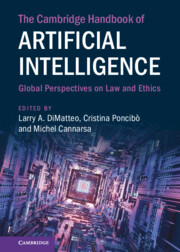Book contents
- The Cambridge Handbook of Artificial Intelligence
- The Cambridge Handbook of Artificial Intelligence
- Copyright page
- Contents
- Figures
- Contributors
- Foreword
- Preface
- Part I AI: Development and Trends
- Part II AI: Contracting and Corporate Law
- Part III AI and Liability
- Part IV AI and Physical Manifestations
- Part V AI and Intellectual Property Law
- Part VI Ethical Framework for AI
- 19 AI, Consumer Data Protection and Privacy
- 20 AI and Legal Personhood
- 21 AI, Ethics, and Law
- 22 Standardizing AI
- Part VII Future of AI
22 - Standardizing AI
The Case of the European Commission’s Proposal for an ‘Artificial Intelligence Act’*
from Part VI - Ethical Framework for AI
Published online by Cambridge University Press: 28 July 2022
- The Cambridge Handbook of Artificial Intelligence
- The Cambridge Handbook of Artificial Intelligence
- Copyright page
- Contents
- Figures
- Contributors
- Foreword
- Preface
- Part I AI: Development and Trends
- Part II AI: Contracting and Corporate Law
- Part III AI and Liability
- Part IV AI and Physical Manifestations
- Part V AI and Intellectual Property Law
- Part VI Ethical Framework for AI
- 19 AI, Consumer Data Protection and Privacy
- 20 AI and Legal Personhood
- 21 AI, Ethics, and Law
- 22 Standardizing AI
- Part VII Future of AI
Summary
The EU Artificial Intelligence Act proposal is based on a risk-oriented approach. While AI systems that pose an unacceptable risk will be banned, high-risk AI systems will be subject to strict obligations before they can be put on the market. Most of the provisions deal with high-risk systems, setting out obligations on providers, users and other participants across the AI value chain. At the heart of the proposal is the notion of co-regulation through standardization based on the New Legislative Framework. Accordingly, this chapter provides a critical analysis of the proposal, with particular focus on how the co-regulation, standardization and certification system envisaged contributes to European governance of AI and addresses the manifold ethical and legal concerns of (high-risk) AI systems.
Keywords
- Type
- Chapter
- Information
- The Cambridge Handbook of Artificial IntelligenceGlobal Perspectives on Law and Ethics, pp. 321 - 344Publisher: Cambridge University PressPrint publication year: 2022
- 14
- Cited by



